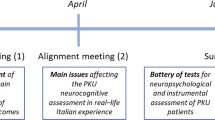Abstract
Designs, analyses and results of longitudinal studies of intelligence of patients treated early for phenylketonuria (PKU) are reviewed. All studies converge on the conclusion that after the age of 10 years, IQ development is stable for different degrees of dietary relaxation. On average, for each 300 μmol/l increase in blood phenylalanine (Phe) levels pre-school, IQ decreases by about half a standard deviation. Children with Phe levels below 400 μmol/l in early and middle childhood had the best outcomes which were near normal. PKU seems to suppress the global level of IQ without impairment of domain-specific competencies. For historical reasons there is no research on IQ development of early treated patients in middle or late adulthood, and it remains unclear whether older age groups might carry new risks.
Conclusion It is argued that control group designs, meta-analysis, and interdisciplinary studies combining psychology, neurology and neuropathology could increase the understanding of phenylketonuria as well as the scientific basis of its treatment.
Similar content being viewed by others
Author information
Authors and Affiliations
Rights and permissions
About this article
Cite this article
Burgard, P. Development of intelligence in early treated phenylketonuria. Eur J Pediatr 159 (Suppl 2), S74–S79 (2000). https://doi.org/10.1007/PL00014388
Issue Date:
DOI: https://doi.org/10.1007/PL00014388




